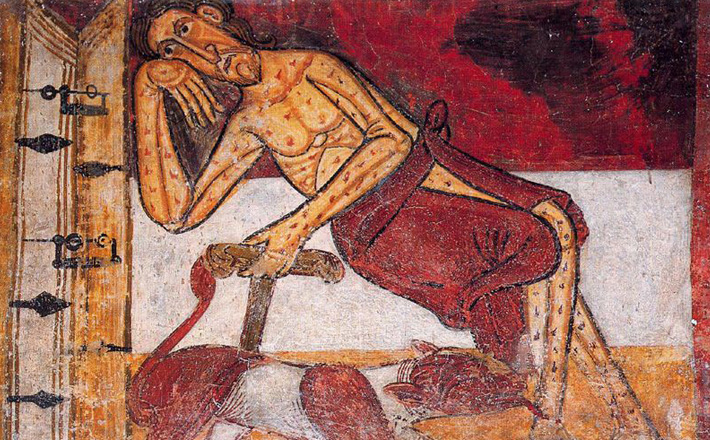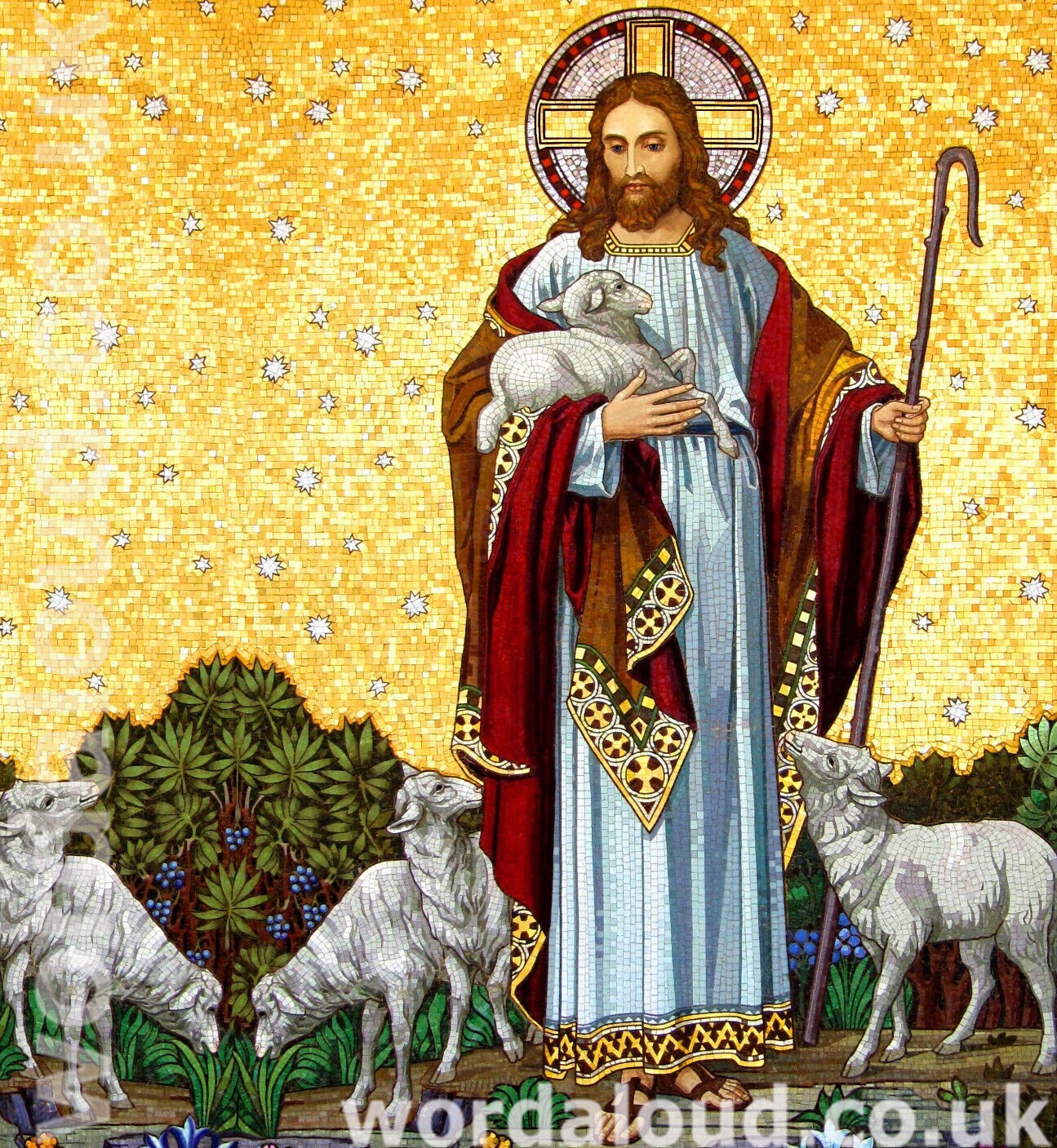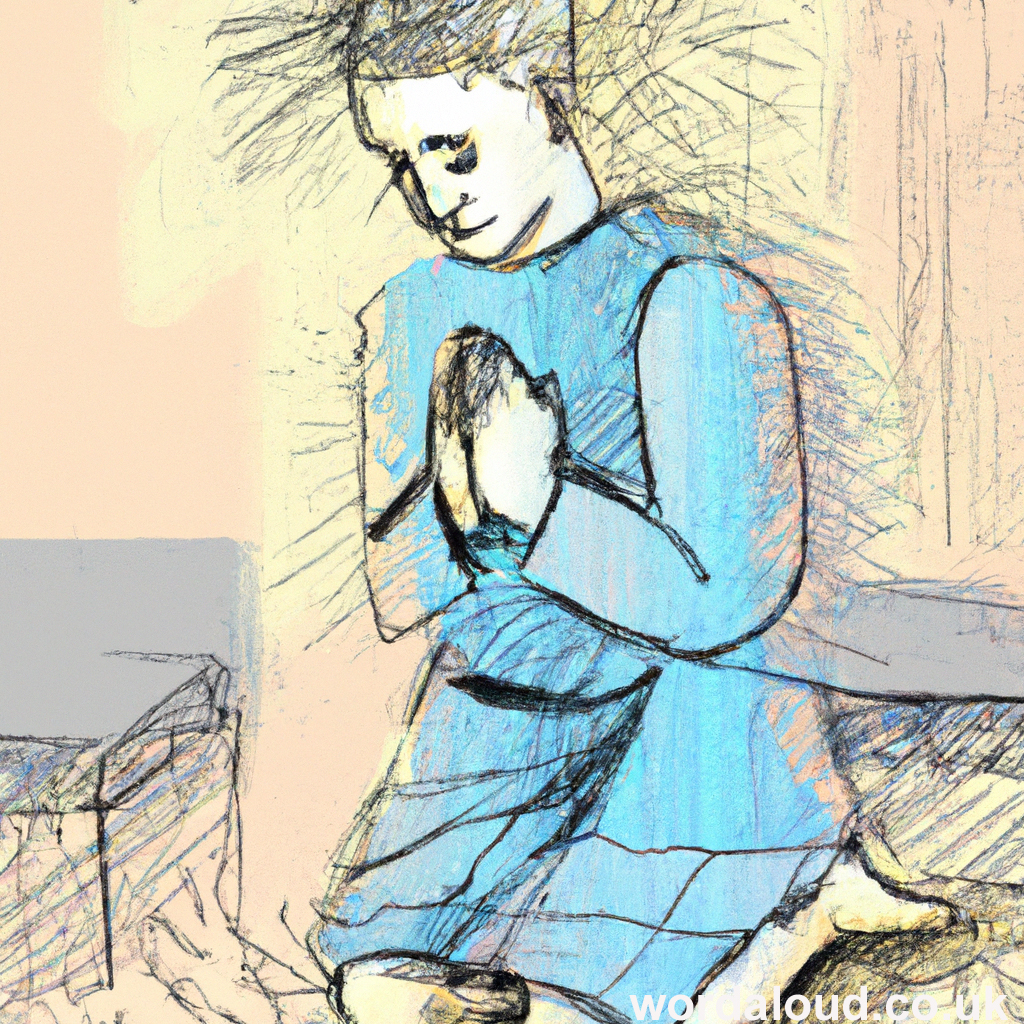Christian Art | Love Revealed By Jesus Christ
Office Of Readings | Week 13, Friday, Ordinary Time | A Reading From The Book Of Saint Augustine, The Predestination Of The Saints | Jesus Christ, Son Of David According To The Flesh
‘Jesus Christ, descendant of David according to human nature.’
Biblical Foundations | Jesus Christ The Predestined Son
Saint Augustine draws primarily on Romans 1:3–4, where Saint Paul writes that Jesus was ‘descended from David according to the flesh and declared to be the Son of God in power according to the Spirit of holiness’. For Augustine, these verses encapsulate the mystery of the Incarnation. Jesus Christ, in his humanity, did not become the Son of God by merit, but was predestined to be so from the very moment of his conception by the Holy Spirit in the Virgin Mary.
This notion is reinforced by Philippians 2:6–11, which details the kenosis (self-emptying) of Christ: though he was ‘in the form of God’, he ‘emptied himself’ and was ‘found in human form’. The divine condescension is not a response to human merit but an act of sovereign grace. Augustine’s focus is this: if even Jesus Christ, the sinless one, did not earn his divine dignity, how much more is grace utterly unmerited for sinners?
Moreover, John 1:14 – ‘The Word became flesh and dwelt among us’ – underpins Augustine’s insistence that the union of divine and human natures in Christ is a pure gift of God, not the fruit of human striving. The Incarnation is thus the definitive example of God’s grace, freely bestowed.
Patristic And Historical Context | A Polemic Against Pelagianism
Saint Augustine was writing in the heat of controversy. The Pelagians, led by the British monk Pelagius, denied the doctrine of original sin and taught that human beings could achieve salvation through their own moral effort. Augustine’s theology of predestination – and especially his insistence that even Christ’s humanity was predestined – forms part of his rebuttal.
In portraying Christ as the supreme instance of divine election, Augustine nullifies any argument that grace is a reward for good behaviour. Christ, the God-Man, did not earn his divine sonship. Rather, his humanity was chosen and assumed by the Word in advance of any merit, thereby demonstrating that divine grace is entirely gratuitous.
Augustine’s position also reflects broader Christological debates in the early Church. While the Council of Nicaea (325) had defined the Son’s eternal divinity, the relationship between his divinity and humanity continued to be clarified. Augustine’s teaching anticipates the Chalcedonian Definition (451), which affirms that Christ is one person in two natures – fully God and fully man – without confusion, change, division, or separation. In Augustine’s language, ‘A man was taken up into God the Word so that he could be at once a son of man and the Son of God.’
By affirming this unique hypostatic union, Augustine rules out any suggestion that Jesus was merely a human hero later divinised by reward. His human nature was never autonomous; it was always united with the eternal Word.
Theological And Philosophical Implications | Grace And Predestination
Augustine’s treatment of predestination in Jesus Christ raises profound theological questions about freedom, merit, and divine foreknowledge. One key image is drawn from the human body: just as grace flows from the head to the members, so the same Spirit that made Jesus Christ holy in his humanity is the Spirit that sanctifies Christians. The grace that made Christ to be holy from the first moment of his conception is the same grace that draws us into life in him.
This image both glorifies Christ and humbles the believer. It affirms that the Christian life is not about earning divine favour, but about receiving and cooperating with grace that always comes first. As Augustine puts it, ‘Let any merits that men may have be silent here – they died through Adam.’
At the same time, this teaching safeguards divine initiative without obliterating human dignity. The mystery of predestination does not deny that we are moral agents. Rather, it affirms that even our freedom is a gift, and our capacity to respond to God is itself the work of grace. Augustine is careful not to promote fatalism; instead, he evokes awe at the scale of divine mercy.
Augustine’s closing contrast – between the divine humiliation and human exaltation – is striking. Christ, he says, descended as low as it is possible for God to go, by taking on death and weakness. Human nature, in turn, is lifted as high as it can be raised, by being united to God in the Person of Christ. This ‘double movement’ reflects the patristic axiom that ‘God became man so that man might become God’ (Athanasius). In Christ, the ladder between heaven and earth is restored.

A Reading From The Book Of Saint Augustine, The Predestination Of The Saints | Jesus Christ, Son Of David According To The Flesh
The shining example of predestination and grace is the Saviour himself, the mediator between God and mankind, himself a man, Christ Jesus. What merits, of good deeds or faith, did his human nature have beforehand, to make this happen? Please, let me have an answer: how did that man earn the privilege of being taken up into unity of person by the Word co-eternal with the Father and of being the only-begotten Son of God? What good quality of his can have made him deserve this? What had he done, what had he believed, what had he prayed for, to come to this indescribable excellence? Surely it was no action of his, but the action of the Word lifting him up, that caused this man, at the moment that he was coming into being, to come into being as the only Son of God!
Let us see, in our own bodies, how the head is the source of grace that flows through the members, filling each according to its capacity. The grace by which every man, from the moment when he comes to believe, becomes a Christian is the same grace by which that man, from the moment when he came to be, became Christ. The Spirit through whom we are reborn is the same Spirit through whom he was born. The Spirit that brings us remission of our sins is the same Spirit that gave him freedom from sin.
God certainly knew beforehand that he was going to make these things happen. This is exactly the predestination of the saints and it shines out most clearly in the predestination of the Saint of saints. How can anyone deny this who properly understands the utterances of the Truth? For we see that even the Lord of glory is the subject of God’s predestination, in so far as at his incarnation a man became the Son of God.
So Jesus was predestined, so that he who was to be, according to the flesh, a son of David should nevertheless be the Son of God in power, according to the Spirit of holiness – because he was born of the Holy Spirit and of the Virgin Mary. Thus in a unique and indescribable way a man was taken up into God the Word so that he could be at once a son of man and the Son of God – a son of man according to the nature that was taken up, the Son of God because of the only-begotten God who took him up. If it were not like this, we would have to believe not in a Trinity but in a Quaternity.
This predestined elevation of human nature is so great, so high, so exalted that there is no greater height left to which it could be raised. On the other side, the very godhead could not throw itself down lower than it did, to the taking on of human nature with all its weaknesses and a final death on a cross. As he, the one, was predestined to be our head, so we, the many, were predestined to be his members.
Let any merits that men may have be silent here – they died through Adam. Let God’s grace reign, as it does reign: the grace of God through Jesus Christ our Lord, the one Son of God, the one Lord. If anyone can find in that man, our Head, pre-existing merits that led to his unique birth, let him look in us, his members, for pre-existing merits that might lead to the rebirth of us all.
Prayer With Jesus Christ
God of all grace and glory,
You chose us in Christ before the foundation of the world,
not for any merit of ours,
but out of your boundless mercy and love.
You predestined your Son to be our Head,
and by his incarnation, passion, and resurrection,
you have drawn us into the mystery of divine life.
Teach us to trust not in our own strength,
but in your saving will, freely given.
As Christ humbled himself to lift us high,
may we, by grace, walk humbly with him:
bearing his image,
sharing his cross,
and rejoicing in his glory.
Through the same Jesus Christ, our Lord,
who lives and reigns with you and the Holy Spirit,
God for ever and ever.
Amen.
Glossary Of Christian Terms
Predestination
The doctrine that God has, from eternity, foreordained all that will come to pass, particularly the salvation of the elect. Augustine teaches that this is a gracious act of God, not based on human merit.
Incarnation
The Christian belief that the second Person of the Trinity, the Word, became flesh in the person of Jesus Christ. Augustine emphasises that this was an act of grace, not a reward.
Hypostatic Union
A Christological term describing the union of divine and human natures in the one Person of Jesus Christ. It affirms that Jesus is fully God and fully man.
Grace
The free and undeserved favour of God, which enables humanity to share in divine life. Augustine sees grace as absolutely prior to any good works.
Pelagianism
A theological heresy that downplays original sin and insists that human beings can achieve salvation without divine grace. Augustine argued fiercely against it.
Trinity
The Christian doctrine that God exists as three persons in one essence: Father, Son, and Holy Spirit. Augustine warns against imagining a fourth being (a human Christ separated from the divine Son).
Merit
Spiritual benefit earned by good works. Augustine argues that neither Christ’s incarnation nor our salvation is due to merit, but to grace.
Mediator
Christ is called the mediator because he bridges the gap between God and humanity, making peace through his life, death, and resurrection.
Kenosis
A Greek word meaning ‘self-emptying’, used in Philippians 2 to describe how Christ humbled himself in the incarnation and death on a cross.
Elect
Those whom God has chosen in Christ for salvation. Augustine teaches that this election is purely by God’s gracious will.








